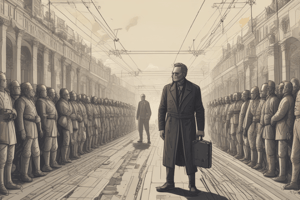Podcast
Questions and Answers
Which subfield of political science focuses on the interactions between countries?
Which subfield of political science focuses on the interactions between countries?
- Comparative Politics
- Public Administration
- International Relations (correct)
- Political Theory
What does the term 'sovereignty' refer to in political science?
What does the term 'sovereignty' refer to in political science?
- The distribution of power within a political entity
- The ability of a government to enforce laws
- The ultimate authority within a territory free from external control (correct)
- The recognition of legitimate power by society
Which research method focuses primarily on understanding political phenomena through numerical data?
Which research method focuses primarily on understanding political phenomena through numerical data?
- Qualitative Methods
- Mixed Methods
- Case Study Analysis
- Quantitative Methods (correct)
In which subfield would you study theoretical works by Plato and Marx?
In which subfield would you study theoretical works by Plato and Marx?
What is the primary focus of Public Administration within political science?
What is the primary focus of Public Administration within political science?
Which of the following best describes 'power' in the context of political science?
Which of the following best describes 'power' in the context of political science?
What are mixed methods in political research?
What are mixed methods in political research?
What social trend is characterized by the rise of movements challenging established political parties?
What social trend is characterized by the rise of movements challenging established political parties?
Which concept signifies legitimate power recognized within society?
Which concept signifies legitimate power recognized within society?
What does Comparative Politics primarily analyze?
What does Comparative Politics primarily analyze?
Flashcards are hidden until you start studying
Study Notes
Overview of Political Science
- Definition: Political science is the systematic study of political institutions, processes, behavior, and power structures within societies.
- Objective: To understand how power is distributed, exercised, and contested.
Key Subfields
-
Comparative Politics
- Compares political systems and governments across different countries.
- Analyzes political phenomena like elections, political parties, and policy outcomes.
-
International Relations
- Focuses on the interactions between countries.
- Examines issues like diplomacy, conflict, trade, and international organizations.
-
Political Theory
- Explores ideas about politics, justice, rights, and the role of the state.
- Discusses the works of major theorists (e.g., Plato, Hobbes, Locke, Marx).
-
Public Administration
- Studies the implementation of government policy.
- Examines the structure and management of public sector organizations.
-
Public Law
- Investigates the role of law in politics.
- Covers constitutional law, administrative law, and human rights law.
Key Concepts
- Power: The ability to influence or control the behavior of people or the course of events.
- Authority: Legitimate power recognized by society.
- Sovereignty: The ultimate authority within a territory, free from external control.
- State: A political entity with a defined territory, population, government, and sovereignty.
Research Methods
- Qualitative Methods: Interviews, content analysis, case studies; focus on understanding political phenomena in depth.
- Quantitative Methods: Surveys, statistical analyses; emphasize numerical data and generalizability.
- Mixed Methods: Combines qualitative and quantitative approaches for a more comprehensive analysis.
Current Trends
- Globalization: Impact on national sovereignty and political dynamics.
- Populism: Rise of populist movements affecting traditional political parties.
- Technology: Influence of social media and digital platforms on political engagement and communication.
Important Theories
- Realism: Views international relations as a power struggle; emphasizes national interest.
- Liberalism: Advocates for cooperation and collective security among states.
- Constructivism: Focuses on the social constructs that shape political identities and interests.
Applications
- Policy Analysis: Evaluating public policies to understand their effectiveness and impact.
- Political Campaigning: Strategies used in elections to influence voter behavior and outcomes.
- Conflict Resolution: Methods for resolving disputes and fostering peace between nations or groups.
Overview of Political Science
- Systematic study of political institutions, processes, behavior, and power structures in societies.
- Aims to analyze how power is distributed, exercised, and contested.
Key Subfields
- Comparative Politics: Examination and comparison of different political systems, focusing on elections, parties, and policy outcomes across countries.
- International Relations: Studies interactions between nations, addressing topics like diplomacy, conflict, trade, and roles of international organizations.
- Political Theory: Delves into political ideas and concepts such as justice, rights, and state roles, referencing major theorists including Plato, Hobbes, Locke, and Marx.
- Public Administration: Focuses on the implementation of policies, exploring the structure and management of public sector organizations.
- Public Law: Analyzes the interplay between law and politics, encompassing constitutional law, administrative law, and human rights.
Key Concepts
- Power: The capacity to influence behavior or outcomes within society.
- Authority: Recognized legitimate power accepted by the societal structure.
- Sovereignty: Represents ultimate authority in a defined territory, free from outside interference.
- State: A political entity characterized by defined territory, population, governance, and sovereignty.
Research Methods
- Qualitative Methods: Utilize interviews, content analysis, and case studies for in-depth understanding of political phenomena.
- Quantitative Methods: Employ surveys and statistical analyses for generalizable conclusions based on numerical data.
- Mixed Methods: Integrate both qualitative and quantitative approaches to gain a well-rounded understanding.
Current Trends
- Globalization: Challenges to national sovereignty and shifts in political dynamics on a global scale.
- Populism: Emergence of populist movements that disrupt traditional political party frameworks.
- Technology: Transformation of political engagement and communication due to the rise of social media and digital platforms.
Important Theories
- Realism: Interprets international relations through the lens of power struggles, emphasizing national interests.
- Liberalism: Promotes state cooperation and collective security as foundational principles.
- Constructivism: Centers on the social constructs that influence political identities and interests.
Applications
- Policy Analysis: Assessment of public policies to determine their effectiveness and societal impact.
- Political Campaigning: Development of strategies in elections to sway voter behavior and drive outcomes.
- Conflict Resolution: Techniques aimed at managing and resolving disputes to foster peace among competing nations or groups.
Studying That Suits You
Use AI to generate personalized quizzes and flashcards to suit your learning preferences.




